The growth of PDD's Temu marketplace has positioned the company as a leader in China's e-commerce sector.
Rafael Henrique | Sopa Images | Lightrocket | Getty Images
According to analysts, PDD's cost-performance positioning and the growth of its Temu marketplace have helped the company lead China's e-commerce sector, making it China's most valuable company in the sector.
PDD Holdings reported stellar first-quarter results last Wednesday, sending its shares soaring 7.5%, giving it a market capitalization that surpasses that of rival Alibaba Group. PDD shares have more than doubled in the past year, rising 109%, according to LSEG data.
PDD, which also owns Chinese discount shopping app Pinduoduo, has a market capitalization of about $208 billion, well ahead of Alibaba's $196 billion, according to LSEG data. JD.com is a distant third, with a market capitalization of $48 billion.
“We believe Tem's profitability will improve more quickly than previously expected due to the company's adoption of a semi-consignment model in which logistics costs are borne by retailers,” Morningstar said in a note on Thursday.
“We believe PDD's domestic platform will be able to defend its position given strong consumer perception of its value for money,” said Morningstar analyst Chelsea Tam, adding that PDD topped the list of consumer preferences, with JD.com and Alibaba in second and third place, respectively.
Goldman Sachs on Friday upgraded PDD to a “buy” rating from “neutral,” noting the company's continued growth momentum in first-quarter advertising revenue and the potential of Temu.
“The upgrade is driven by the company's ad tech capabilities, cost-competitive suppliers/merchants/supply chain in China, and a favorable risk/reward profile, and the current market cap suggests Temu is not overvalued,” Goldman Sachs analyst Ronald Keung said in a note.
Keung said the market was “already fully pricing” in the two main concerns – domestic competition and U.S.-China conflict – that led to PDD's downgrade in March.
PDD also surpassed Alibaba's market capitalization in the fourth quarter of last year, but lost the top spot to Alibaba in the first quarter, according to LSEG data.
PDD said on Wednesday its first-quarter net profit attributable to ordinary shareholders rose 246 percent from a year earlier to $3.87 billion (CNY27.99 billion), well above LSEG's forecast of 12.86 billion yuan.
Revenue from transaction services (also known as merchant fees), Revenues totaled $6.14 billion, up 327% from the same period last year.
“We have proactively responded to consumption promotion policies and launched a series of promotional activities to meet users' shopping needs during the Chinese New Year and other seasonal events,” PDD said in its earnings release.
PDD said it was “confident in China's consumer market.”
Meanwhile, Alibaba's net profit attributable to ordinary shareholders fell 86% year-on-year to 3.3 billion yuan in the March quarter. Alibaba owns e-commerce platforms such as AliExpress, Alibaba.com, Taobao and Tmall.
PDD's first big foray overseas was Temu in September 2022, which saw its popularity soar shortly after it aired a Super Bowl ad in 2023 inviting customers to “shop like a millionaire.”
Bargain-hungry Americans are flocking to Thame. Rapid growth is expected to continue in the U.S. Tem is also aggressively expanding into the U.K., Australia, New Zealand, France, Italy, Germany, the Netherlands and Spain.
Bank of America said in a report earlier this month that Tem, TikTok and AliExpress “leverage the experience” of their parent and sister companies, adding that it believes Tem is “relatively well-positioned” among them.
Clarification: Article has been updated to reflect that PDD reported its results last Wednesday.


